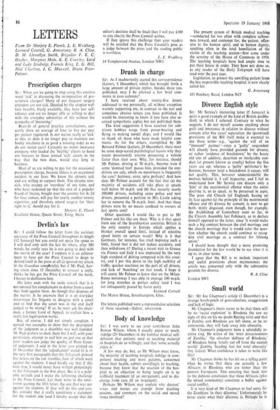Devlin's law
Sir: I could follow the letter from the assistant secretary of the Press Council throughout its length (12 January) but you could not spare the space so I will deal only with the last bit where, after 500 words, he coolly says he is not going to deal with
the merits of the case! I suppose it is an achieve- ment to have got the Press Council to deign to defend itself in the press at all (it ignored my attack in the Guardian completely), but if Mr Paul, hav- ing taken since 15 December to concoct a reply, thinks he has got the Press Council off the hook, I hasten to disillusion him.
His letter ends with the snide remark that it is not unusual for complainants to demur from a court that finds against them. As though that disposes of the matter. Is he unaware that it is an everyday Occurrence for litigants to disagree with a court and to find that the court was in the end itself judged to be wrong? If so, he must ask his chair- man, a former Lord of Appeal, to explain how a really fair legal system works.
But, of course, 1 did not simply complain. I quoted two examples to show that my description of the judgment as a shambles was well founded. Mr Paul prefers to duck them but I will, with your permission, attempt to nail him on just one so that your readers can judge the quality of Press Coun- cil judgments. I said in the letter you printed on 15 December that the 'adjudication' stated (it is in the very first paragraph) that the Telegraph printed five letters on the LSE troubles, four of which were against the students. I need hardly say that if this were true, I would never have written protestingly to the Telegraph in the first place. But it is a palp- able untruth and I make the following challenge to the Press Council. Let them write to the SPEC- TATOR quoting the fifth letter, the one that was not against the students. If they will do this and you, Sir, consider that it really constitutes a statement for the student side (and I hereby accept that the
editor's decision shall be final) then I will pay £100 to any charity the Press Council wishes.
If they ignore this challenge then your readers will be satisfied that the Press Council's pose as a judge between the press and the reading public is worthless.
L. E. Weidberg 14 Templewood Avenue, London NW3


































 Previous page
Previous page